Key Points
- President Jimmy Carter’s Christian faith shaped his presidency and post-presidency work building Habitat for Humanity homes, helping to end guinea worm disease and fostering peace worldwide.
- He was a lifelong Baptist who maintained close ties with United Methodists.
- Nowhere was that more apparent than at United Methodist-related Emory University, a partner in establishing The Carter Center.
The United States lost a great humanitarian and brilliant leader with the passing of former President Jimmy Carter, said his longtime friend the Rev. James Laney, former dean of Candler School of Theology, president of Emory University and U.S. ambassador to South Korea.
Carter, the United States’ 39th president who redefined post-presidency, died Dec. 29 at his home in Plains, Georgia. He was 100.
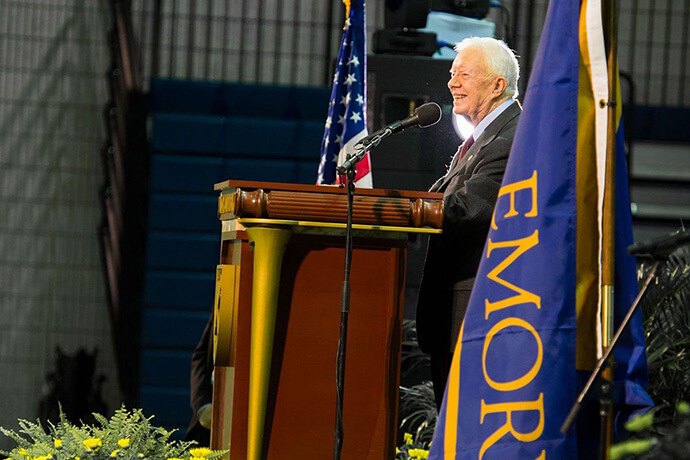
Carter was a lifelong Baptist who long taught a well-attended Sunday school class at his home Maranatha Baptist Church in Plains. However, he and his late wife, Rosalynn, maintained strong ties with United Methodists over the years. The two married at Plains Methodist Church in 1946. United Methodist Bishop William R. Cannon gave the inaugural prayer for Jimmy Carter's presidential inauguration. Glenn Memorial United Methodist Church in Atlanta hosted Rosalynn Carter’s memorial service in 2023.
"United Methodists across the state mourn the loss of President Jimmy Carter: a justice-seeker, a peacemaker, a faithful follower of Christ, and our neighbor," Bishop Robin Dease, who leads the North Georgia and South Georgia conferences, said in a statement.
"Because we know of President Carter's great faith, we do not grieve as those who have no hope," she added. "We trust in Jesus, who is the resurrection and the life, and who goes to prepare a place for us."
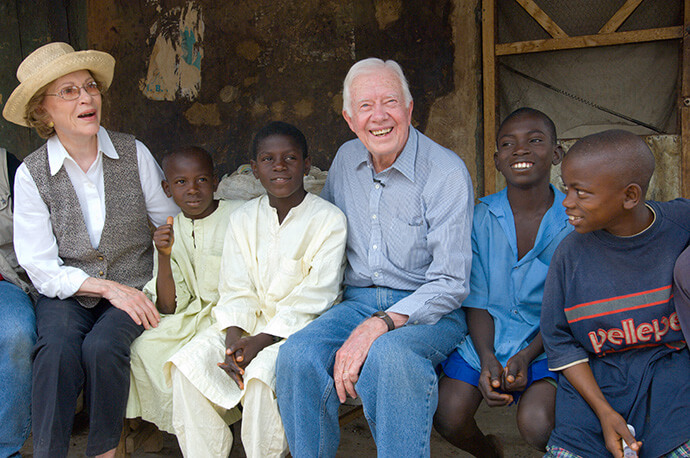
Nowhere was the Carters’ connection to Methodism more apparent than at United Methodist-related Emory University in Atlanta. Laney appointed Carter as University Distinguished Professor at Emory in 1982 soon after the president’s loss of a second term, and Emory collaborated with the former president to establish The Carter Center in Atlanta.
“I have a lot of fond memories,” Laney said. “We would have monthly meetings and as I reflect on him, his unpretentious moral character proved to be so amazingly important for American culture — American society especially given the times we are now in when truth is often ignored.”
In his campaign for president, Carter vowed he would never lie to the American people. It was a promise he kept, Laney said.
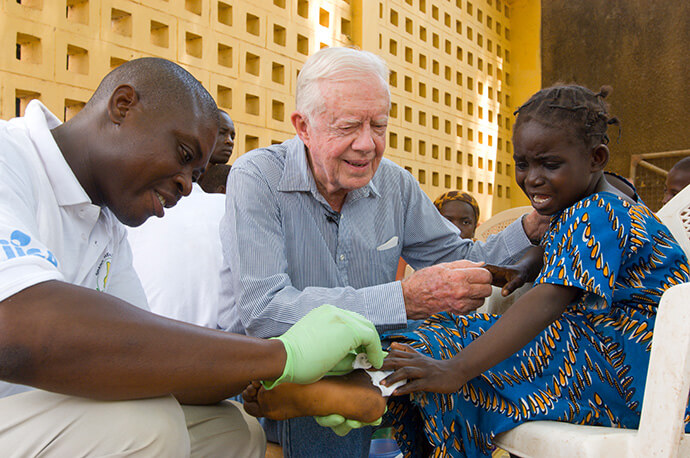
The United Methodist Council of Bishops also expressed gratitude for the way Carter lived his Christian faith.
“President Carter’s life was a testament to his deep faith and commitment to serving others. As the 39th President of the United States, he demonstrated remarkable leadership, championing peace, human rights, and poverty eradication,” said Council of Bishops President Tracy S. Malone in a statement on behalf of the bishops.
“His selfless dedication to promoting fairness and justice globally, particularly through election monitoring, has left a lasting impact on nations where United Methodists reside.”
Malone, who also leads the Indiana Conference, added that Carter’s legacy of faith in action will continue to inspire generations to come.
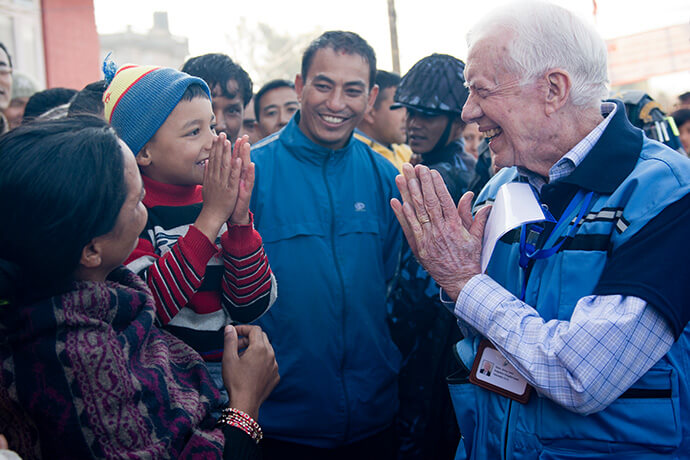
Former President George W. Bush, the most recent United Methodist to hold the presidency, shared a similar sentiment.
“President Carter dignified the office,” Bush said in a statement. “And his efforts to leave behind a better world didn’t end with the presidency.”
Laney said that Carter was resolved to continue many of the efforts to which he was committed while in the White House — human rights, disease eradication and worldwide peace work.
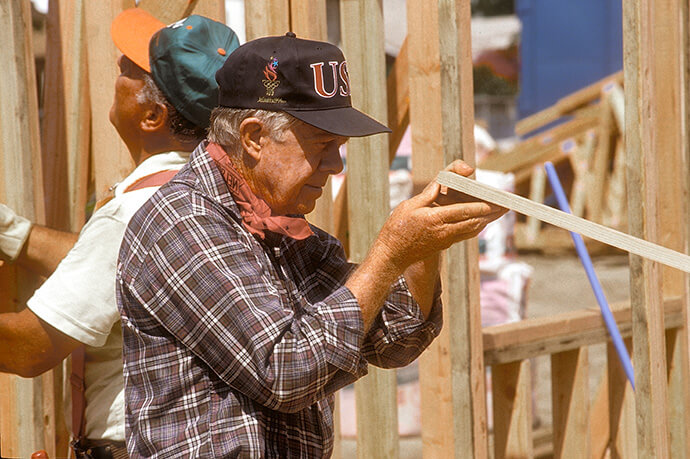
Famously, the former president and first lady led the Jimmy & Rosalynn Carter Work Project for Habitat for Humanity for more than 30 years. Together, the two worked alongside over 108,100 volunteers — including hundreds of United Methodists — who built, renovated or repaired more than 4,447 homes in 14 countries.
Possibly more impactful were the Carters’ efforts to eradicate guinea worm disease. When The Carter Center launched its campaign in 1986, an estimated 3.5 million people in 20 African and Asian countries were afflicted with the crippling illness caused by a parasite. As of 2023, The Carter Center reported that only 14 human cases were reported across four African nations.
“I used to introduce him, much to his discomfort, as the first president to use the White House for a stepping stone,” Laney said. “He would laugh. But the fact is he continued to grow and do things that were of worldwide significance after he left Washington.”
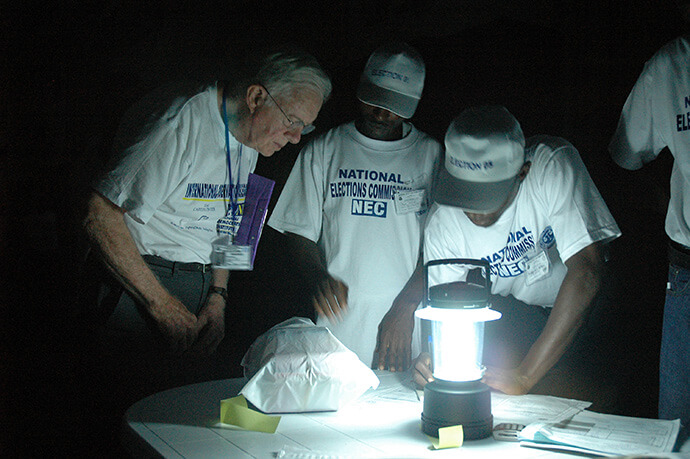
The World Methodist Council — an ecumenical association of some 80 denominations with Wesleyan roots — awarded Carter the World Peace Award in 1985. He was the first American to receive the award, which recognized him as an instrument of peace. Carter also won the Nobel Peace Prize in 2002 for his decades of effort to find peaceful solutions to international conflicts.
The World Methodist Peace Award cited Carter “for his leadership in the return of the Panama Canal to Panama, the SALT II agreement, the Camp David Accord between Israel and Egypt and his post presidency efforts in reducing conflict in the world, lifting the plight of the poor, and to promote understanding among all people.”
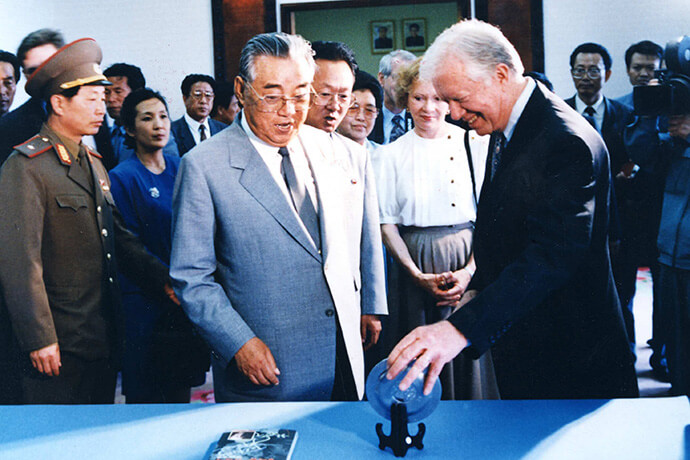
In 2018, President Carter participated in a Korea Peace Round Table hosted by the United Methodist Board of Global Ministries.
United Methodist Bishop Hee-soo Jung, who leads the East Ohio and West Ohio conferences, met Carter during that discussion that included 100 people from around the world.
National day of mourning
President Joe Biden declared Jan. 9 a national day of mourning for former President Jimmy Carter. The date coincides with Carter’s official state funeral, which will be held at the Washington National Cathedral in Washington, D.C. Read more about Carter’s funeral’s services.
“We hold President Jimmy Carter in our prayers and gratitude,” Jung said. “I am so thankful President Jimmy Carter has been a wonderful advocate for Korea peace. I had an opportunity to deliver our heartfelt thanks to him at the backstage before his address in Korean Peace Roundtable, 2018.”
During that discussion, Carter said, “I can’t think of a more worthy comprehensive effort for the Methodist churches of the world and for the World Council of Churches together and others … than to work for peace in the Korean Peninsula and also particularly for peace between North Korea and the United States.”
Jung said many United Methodists continue to pray for normalization of relations between the United States and North Korea. In the meantime, he said, he gives thanks to God “because of President Carter’s peace-loving leadership and his commitment. We remember his smiles and modeled servant-leadership journey.”
The Rev. We Hyun Chang, director of connectional ministries in the New England Conference, attended the roundtable where Carter spoke.
Chang credits Carter’s visit to North Korea in June 1994 with preventing imminent war on the Korea Peninsula. The visit, Chang said, “also opened a new path between North Korea and the United States toward a nonviolent and peace-seeking resolution. He was a genuine peacemaker in the mold of Jesus Christ.”
Chang said Carter offered to visit North Korea in 2019 to try to break the tension and hostility. “He was 94!”
Subscribe to our
e-newsletter
The Rev. Kil Sang Yoon, a retired United Methodist pastor, remembered Carter as an ambassador “for healing and reconciliation in the midst of the alienation and enmity among and between the siblings of human family.”
Laney said Carter was a man of many gifts — a writer of books and poetry, a woodworker and a fly fisherman.
“You can just go on and on,” Laney recalled. “He just does things; he doesn’t make a big deal out of them. I think for Christians this a mark of true Christian character.”
Laney said Carter has made an “indelible mark on the character of the man who occupies the power of the White House. I think he is going to go down in history like President Harry Truman, initially underestimated. His stature is going to grow on and on as the years go by.”
Laney hopes people appreciate the qualities Carter represented in his life.
“I hope it will change the direction of the way our country is headed.”
Gilbert is a freelance writer in Nashville, Tennessee. Heather Hahn, assistant news editor for UM News, contributed. Contact them at (615) 742-5470 or [email protected]. To read more United Methodist news, subscribe to the free daily or weekly Digests.




